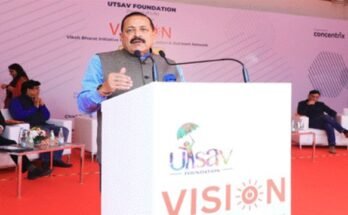New technologies, ever-changing skills requirements and outdated curricula are challenging India’s higher education system in its efforts to equip graduates with job-ready skills. “Our workforce needs skills aligned to technology shifts and market needs,” says Vanitha Narayanan, chairman, IBM India. Narayanan has over 29 years of experience working in IBM across several countries. According to her, IBM values India as a market and a source of talent and innovation. “I see tremendous opportunity for us to power India’s digital transformation with our cognitive cloud platforms and deep industry expertise,” she tells Sudhir Chowdhary in a recent interview. Excerpts of an interview with her:
What are your key priorities as IBM India chairman?
IBM has a very large footprint in India and values India as a market and a source of talent and innovation. The role of chairman was created to place equal focus on strategic priorities, strengthen our partnership with the government and the ecosystem, lead the transformation of our capabilities and work closely with our labs in India in building local innovations with global impact. How is IBM aligned to India’s digital nation agenda? Can you talk about a few initiatives? As India rapidly evolves from a resource-constrained to a data-rich country, IBM’s Cognitive Cloud platform is designed to deliver better citizens’ services, governance security, etc. We are leveraging our deep industry expertise and the cognitive capabilities of Watson to scale expertise in healthcare, education, financial services, talent management and many other areas.
As a follow-on to our paper The Indian Century, IBM recently conducted a series of studies (IBM Institute for Business Value study) across healthcare, automotive, and education and did a deep-dive on how start-ups are re-defining the country’s economic growth. The studies bring out how technologies such as cloud, analytics, mobile, cognitive and security, complemented with a robust infrastructure will create possibilities for India’s growth and transformation.
We are also working with several state governments to tie up with local government schools to train children to focus on their STEM (science, technology, engineering and mathematics) skills at the high school level. IBM’s Teachers Try Science programme aims to bridge the STEM gap in the country. The mission is to put technology and design based thinking at the forefront of reshaping and disrupting science teaching in schools, especially less served ones. There is a need to shift the needle in science education, to prepare students to be global citizens while providing them with the skills and abilities for them to thrive, more so in rural and less served India.
You have spoken about how affordable innovation will drive the government’s Digital India initiative. Can you elaborate on that?
The government is focused on building a $1 trillion digital economy. Through initiatives like Smart Cities, there is focus on the physical infrastructure but we need to equally focus on social infrastructure like healthcare and education. In both these areas, the demand far outstrips supply and skills are scarce. So, the need is to expand access and scale expertise. I see a significant opportunity in these two sectors where affordable innovations that are uniquely tailored have the potential to address both supply and demand aspects of inequality—a combination of global and local innovation.
How can the Indian workforce re-skill itself to remain relevant in the changing industrial scenario?
India aspires to become a knowledge-driven economy, so it has to focus on higher order skills and move up the value chain. Our workforce needs skills aligned to technology shifts and market needs. Skilling in the future will be continuous and people will have many careers within a career. I am optimistic about the industry and the kind of jobs that will be created. This requires a continuous focus on contextual skilling. The industry, ecosystem and government should come together so that both our formal education system and vocational training can be future-proofed and can complement each other.
How are IBM’s labs in India contributing locally and globally?
At IBM Labs, we invent things that matter to the world and make scientific breakthroughs that transform industries and society. Some of our local innovations developed in India and globally applicable are:
Cognitive Fashion: IBM India Research Labs have developed a set of capabilities that leverage deep image understanding and natural language cognitive technologies to transform fashion retail. A consumer can engage with a fashion portal and search for a product in natural language or use visual search to get to the relevant product choice in a snap. For a chosen product, the cognitive technology can also recommend accessories and help complete the look in line with latest trends. For consumers who are looking at a personal stylist, the cognitive agent can engage with the consumer in natural language conversation and help with outfit recommendations. Designers and fashion houses across the world from Melbourne to New York are working with IBM Research Cognitive Fashion technologies in identifying latest fashion trends and even taking inspiration from Watson generated prints in launching new couture.
Precision Agriculture: Imagine a precision farming advisory that gives the farmer highly customized and real-time recommendations at a sub-acre level on irrigation amounts, pesticide choice and timing and fertilizer applications to maximize the productivity of the farm, while minimizing the resources used throughout the growth stages of the crop. Using cognitive computing from The Weather Company, satellites, images from camera phones, local sensors and Watson IoT , we are able to deliver real-time insights on low-end mobile phones (feature phones, app or chat interfaces in smartphones).
Digital Precision Agriculture brings these capabilities together in a highly cost-effective form to farmers and other stakeholders. These services can be used to transform agricultural value chains (example, commodity trading, food processing, supply chains), and agricultural finance (credit and insurance). Watson Education: Education has two primary parts, teaching and learning. With IBM Watson Education educators and learners together can transform the learning experiences throughout the life-cycle learning journey.
What is IBM’s strategy for addressing rising cyber security issues?
IBM Security helps accelerate the ability to out-think threats with security innovations that uniquely incorporate cognitive, cloud, and collaboration. IBM’s portfolio of security products are “cloud ready”, meaning that they help protect clients’ people, data, applications and infrastructure. We also work with many of the largest cloud service providers and telecommunications companies in the world to help them build security into their cloud offerings. We offer flexible and scalable managed security services from the cloud for organisations that may lack the internal resources needed to transform their business.
Note: News shared for public awareness with reference from the information provided at online news portals.



